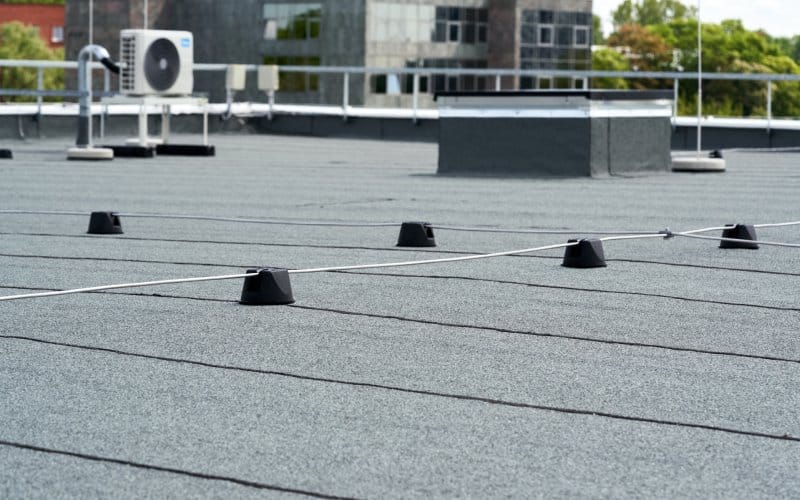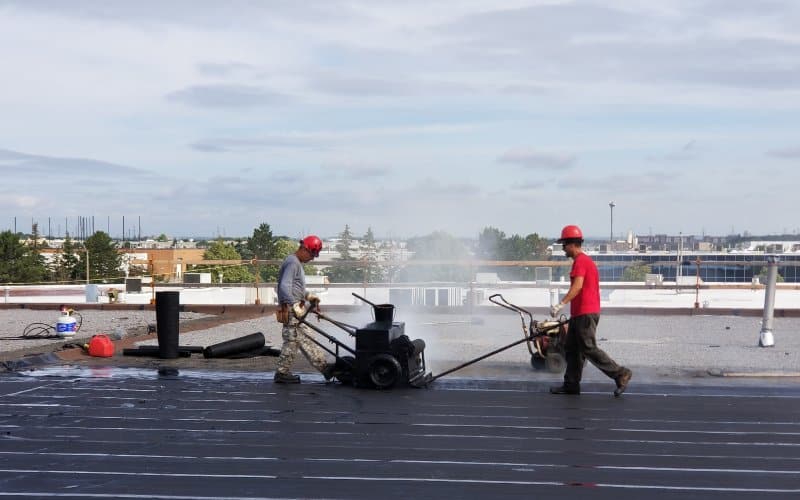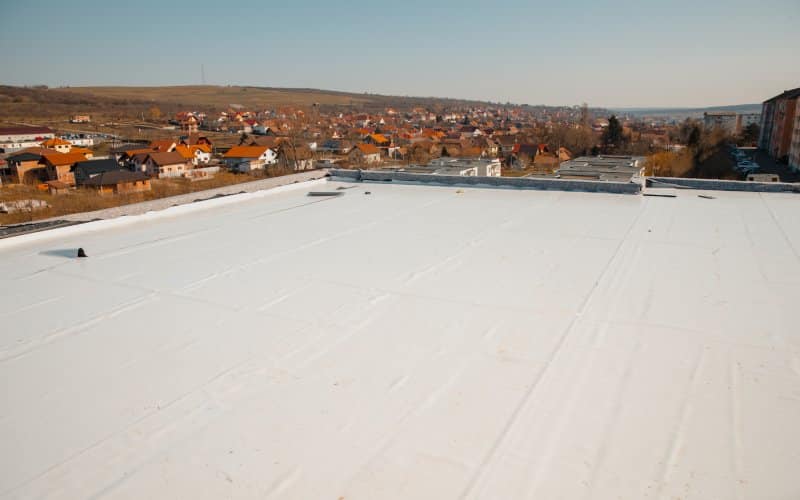500 Hood Road, Suite 320Markham ONL3R 9Z3

Commercial roofs need to protect buildings against the elements and not contribute to any energy inefficiencies. As a commercial building roof reaches the end of its lifespan, it starts to lose its ability to perform its essential functions effectively.
Knowing the expected lifespan of a commercial roof is crucial for budgeting, maintenance planning, and protecting your commercial building investment.
The lifespan of a commercial roof is 20-60 years but it might vary significantly based on several factors, including the type of roofing material used, the quality of installation, the climate in which the building is located, and the frequency and quality of maintenance the roof receives.
Roofing Material: Different materials have varying lifespans. For instance:
Modified Bitumen Roofing offers a lifespan of approximately 20 to 30 years.
EPDM (rubber) roofs typically last about 25-30 years.
Metal roofs are known for their durability, often lasting 30-60 years.
TPO and PVC roofs, which are types of thermoplastic roofs, generally have a lifespan of 20-30 years.
Built-up roofs (BUR) and Modified Bitumen roofs can last 20-30 years.
Proper installation and maintenance are essential to achieve the maximum lifespan of a commercial roof. A well-installed roof provides structural integrity, prevents leaks, withstands harsh weather conditions and other forces. Regular maintenance, including inspections and repairs, addresses wear and tear before it can damage a commercial roof further.
If not both installed and maintained properly, a commercial roof is susceptible to premature degradation, leaks, structural damage, and a shorter life.
The type of roof installed will impact the longevity; this includes roof slope, roofing material,
Typical commercial roofing is a low slope, or flat, roof. Flat roofs, though cost-effective and versatile, pose greater challenges for drainage. They are more susceptible to water ponding, which can accelerate wear and tear, leading to leaks and reduced longevity. Careful installation and regular maintenance are crucial for flat roof designs to ensure water doesn't accumulate and damage commercial roofing systems.
Choosing the right roofing material for your building is essential; below are some common commercial roofing materials and their expected life spans.
Commercial metal roofing offers durability and longevity, so is a popular flat roof material choice. Various roofing materials that take advantage of metal's strength include steel, aluminum, and copper. Each provides unique properties, benefits, and average lifespans. Steel roofs last 30-45 years, aluminum roofs typically endure 40-60 years, while copper roofs can last over a 100years.
Factors contributing to the length of time that metal roofs last include its exceptional ability to withstand extreme weather conditions and its resistance to fire, pests, and rotting. Reflective coatings improve energy efficiency. A metal roof typically requires less maintenance, so is less susceptible to premature failure due to deferred maintenance.
A built-up roofing system uses multiple layers of roofing felt and bitumen, covered with a gravel or mineral cap sheet. This traditional roofing system boasts remarkable durability, making it a popular choice for commercial buildings. These roofs can last anywhere from 20 to 30 years, or potentially longer with excellent ongoing maintenance.
The multiple layers contribute to its durability and resistance to foot traffic and punctures. It can be resurfaced and repaired to help extend its lifespan. It also provides good insulation and UV protection which can help protect underlying waterproofing, membranes, and roofing systems to extend their life spans as well.

Modified bitumen roofing is an advancement of built-up roofing systems, and features enhanced flexibility and adaptability. This roofing system uses modified asphalt, often reinforced with polyester or fiberglass. Modified bitumen roofs are extremely resistant to weather, thermal shock, and UV exposure and offer a lifespan of approximately 20 to 30 years.
This system can be installed as a multi-ply system for added durability and is good for buildings in regions with severe weather conditions. It is also easy to repair and maintain, increasing the likelihood it will be maintained properly to achieve its maximum lifespan.
Ethylene propylene diene monomer roofing is a single-ply rubber membrane that is affordable and offers a simple system. EPDM roofing generally lasts for about 25 to 30 years with proper maintenance.
It is resistant to ozone, UV radiation, and temperature extremes, with a good ability to withstand hail and wind; all of this helps it last longer without deterioration, and has minimal maintenance requirements.
Thermoplastic olefin roofing is a single-ply membrane that offers high energy efficiency and reflective properties. TPO roofs are highly resistant to heat, UV radiation, and chemical exposure, so are becoming popular for many commercial buildings. The average lifespan of this roofing system ranges from 20 to 30 years.
These roofs are also resistant to algae and mold growth and can be heat-welded for added durability.
Polyvinyl Chloride (PVC) roofing is another single-ply membrane option and also offers energy efficiency with durability. These are often chosen for their cool roofing properties. PVC roofs are resistant to chemicals, fire, and UV radiation. When properly maintained, they can last 20 to 30 years or more.
This commercial roof system also provides strong puncture and tear resistance. Welded seams provide additional strength.

A commercial building owner needs to carefully consider specific needs, budget, maintenance requirements, and potential lifespan when selecting roofing systems. Another component is to ensure adequate inspections to assess and identify potential concerns.
Professional roofing inspections are crucial for ensuring maintenance is effective and extending the lifespan of commercial roofs. These assessments identify issues like leaks, damaged materials, and structural weaknesses. By addressing problems early, costly repairs and premature replacement can be avoided. Regular inspections enable timely maintenance and repairs, ensuring the roof's durability and longevity, while also enhancing energy efficiency and safety for the entire building.
ABSI offers roofing consulting services to help commercial business owners get the most out of their low-slope roofing systems, for better longevity.

Naji Hassan, a renowned professional in Building Science and Engineering, brings a wealth of knowledge and experience to his field. Educated at Beirut Arab University and Harvard Business School Online, Hassan has honed his expertise in structural and municipal engineering, building science, and business management. As the President of Accent Building Sciences and an experienced Senior Project Manager, he has made significant strides in building envelope engineering, building condition assessments, and energy retrofit programs. His commitment to innovation and excellence is evident in his approach to large-scale project management and his active participation in industry organizations. Hassan is not only a leader in his field but also a prolific writer and thought leader. He regularly shares his insights and experiences through articles on LinkedIn, which can be found at LinkedIn Articles. Additionally, he maintains a blog where he delves deeper into various aspects of building science, accessible at Accent Building Sciences Blog. Outside of his professional pursuits, Hassan enjoys travel, golf, languages, gardening, and music, reflecting his diverse interests and well-rounded character. Naji Hassan's journey in building science and engineering is not just a career but a testament to his lifelong dedication to learning, teaching, and inspiring others in his field.

500 Hood Road, Suite 320Markham ONL3R 9Z3